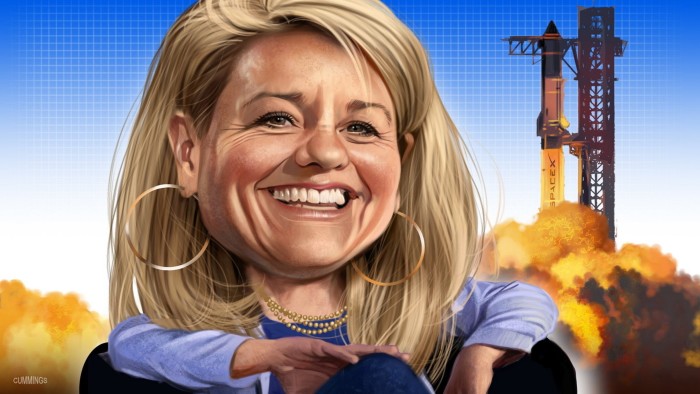During the chaos of Elon Musk’s Twitter takeover in 2022, Nasa administrator Bill Nelson was starting to worry.
He summoned Gwynne Shotwell, president and chief operating officer of Musk’s rocket company SpaceX, the agency’s most important partner. “Tell me that the distraction that Elon might have on Twitter is not going to affect SpaceX,” he recalled asking.
Shotwell told him that he had nothing to worry about. “I hugged her with a smile on my face, because I know she is running that thing,” he said, adding later that she was “one of the most important decisions [Musk] ever made”.
For 22 years, Shotwell has helped to guide Musk’s moonshot project to disrupt the space industry. This week, SpaceX became the world’s biggest private start-up, valued at $350bn.
It has become so essential to the US government that it will soon be used to rescue two astronauts stranded on the International Space Station.
Donald Trump — to whom Musk donated over $250mn during the election campaign — devoted part of his presidential victory speech to SpaceX’s historic technical feat, when it caught the massive Starship rocket booster using its “mechazilla” robotic arms — “just like you hold your little baby at night”.
The company has also launched a network of low-orbit satellites that could one day become the dominant way in which the world accesses the internet. If it goes public, or lists its broadband subsidiary Starlink, it will almost certainly be the biggest US IPO on record.
Shotwell has quietly been at the centre of all of these achievements, shunning the circus that swirls around the world’s richest man. Now 61, she has also managed to spend two decades beside the mercurial billionaire without falling out or burning out, an achievement that is “unprecedented,” according to Eric Berger, who has written two books about SpaceX.
“She is a very blunt and direct person, not unlike Elon, they share a lot of traits. It is SpaceX versus the world and they’ve been simpatico on that from day one,” he says. “She is a steel fist behind a velvet glove: a lovely personality, outgoing, funny and laughs a lot, but you can’t push her around.”
Born Gwynne Rowley in Illinois in 1963, Shotwell grew up in Libertyville, a suburb of Chicago, where she was a straight-A student and cheerleader. During her teens, her mother dragged her to a Society of Women Engineers conference — an event that changed her opinion on engineers as “nerds, social outcasts, nose pickers”, she said in a 2012 interview with the alumni magazine for Northwestern University, where she studied mechanical engineering and applied mathematics.
Her first professional role was at Chrysler, before joining The Aerospace Corporation and then rocket company Microcosm. In 2002, an ex-colleague introduced her to Musk, who offered her a job the same day. She joined as the seventh employee of SpaceX — one co-worker remembers her having the nickname “007” — hoping to galvanise space exploration out of a period of “stagnation” and “constipated” bureaucracy.
Her husband shares a similar mission as an engineer at Nasa’s Jet Propulsion Laboratory. The pair live on a 1,000 acre ranch in Hamilton County, Texas. Shotwell has installed a Starlink Mini device on top of her car in order to speak to Musk without interruption on her commute.
In 2008, she was promoted to president. She now oversees more than 13,000 staff tasked with developing reusable rockets capable of carrying humans to Mars.
“If Elon is the visionary, she is the get-shit-done person,” says one employee. “She transforms vision into reality, watches the bottom line, manages the exec team and keeps him away from regulators.”
As a foil to the volatile Musk, Shotwell’s diplomatic skills are essential for a company that relies on $15bn of federal space and defence contracts, while facing numerous regulatory probes and allegations of environmental violations.
“It’s hard to quantify or separate SpaceX’s success from her — not to diminish Elon’s role — but Gwynne has been the leader on the government relations side for decades, and that is a huge, critical part of their success,” says Lori Garver, a former deputy administrator of Nasa.
“People, especially now, see the challenges she must go through working with Elon. She is able to put blinkers on,” Garver adds. “It makes a lot of us feel better that someone like Gwynne would stay that long . . . Nasa would often just dismiss questions about Elon and say ‘we work with Gwynne’.”
Those willing to talk on the record are fulsome. But even they are rare, such is the omertà among Musk’s lieutenants, staff and backers. Shotwell declined to be interviewed. A colleague says she knows how to stay out of headlines.
After so long at SpaceX, staff now wonder whether she might be ready to try something new. As an early employee, she is almost certainly a billionaire via pay and stock options. Some muse that she might make a good Nasa administrator.
This would be an adjustment. Over the years, Musk’s style has rubbed off on her. In 2018 she said a SpaceX vehicle called BFR — Big Fucking Rocket — would blast 100 passengers half way around the world in 30 minutes “within a decade, for sure”. “That’s Gwynne time”, she noted. “I’m sure Elon will want us to go faster.”
Read the full article here

